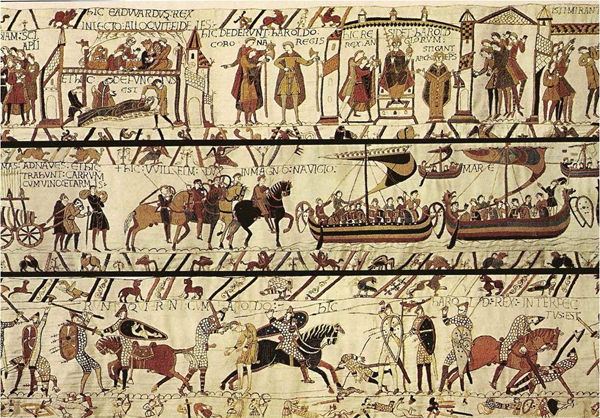
William the Conqueror invades England on September 28, 1066
William the Conqueror invades England: Claiming his right to the English throne, William, duke of Normandy, invades England at Pevensey on Britain’s southeast coast. His subsequent defeat of King Harold II at the Battle of Hastings marked the beginning of a new era in British history.
William was the illegitimate son of Robert I, duke of Normandy, by his concubine Arlette, a tanner’s daughter from the town of Falaise. The duke, who had no other sons, designated William his heir, and with his death in 1035 William became duke of Normandy at age seven. Rebellions were epidemic during the early years of his reign, and on several occasions the young duke narrowly escaped death. Many of his advisers did not. By the time he was 20, William had become an able ruler and was backed by King Henry I of France. Henry later turned against him, but William survived the opposition and in 1063 expanded the borders of his duchy into the region of Maine.
In 1051, William is believed to have visited England and met with his cousin Edward the Confessor, the childless English king. According to Norman historians, Edward promised to make William his heir. On his deathbed, however, Edward granted the kingdom to Harold Godwine, head of the leading noble family in England and more powerful than the king himself.
In January 1066, King Edward died, and Harold Godwine was proclaimed King Harold II. William immediately disputed his claim. In addition, King Harald III Hardraade of Norway had designs on England, as did Tostig, brother of Harold. King Harold rallied his forces for an expected invasion by William, but Tostig launched a series of raids instead, forcing the king to leave the English Channel unprotected. In September, Tostig joined forces with King Harald III and invaded England from Scotland. On September 25, Harold met them at Stamford Bridge and defeated and killed them both. Three days later, William landed in England at Pevensey.
With approximately 7,000 troops and cavalry, William seized Pevensey and marched to Hastings, where he paused to organize his forces. On October 13, Harold arrived near Hastings with his army, and the next day William led his forces out to give battle. At the end of a bloody, all-day battle, King Harold II was killed–shot in the eye with an arrow, according to legend–and his forces were defeated.
William then marched on London and received the city’s submission. On Christmas Day, 1066, William the Conqueror was crowned the first Norman king of England, in Westminster Abbey, and the Anglo-Saxon phase of English history came to an end. French became the language of the king’s court and gradually blended with the Anglo-Saxon tongue to give birth to modern English. William I proved an effective king of England, and the “Domesday Book,” a great census of the lands and people of England, was among his notable achievements. Upon the death of William I in 1087, his son, William Rufus, became William II, the second Norman king of England.
History Channel / Wikipedia / Encyclopedia Britannica / Biography / English Monarchs / Catholic Encyclopedia

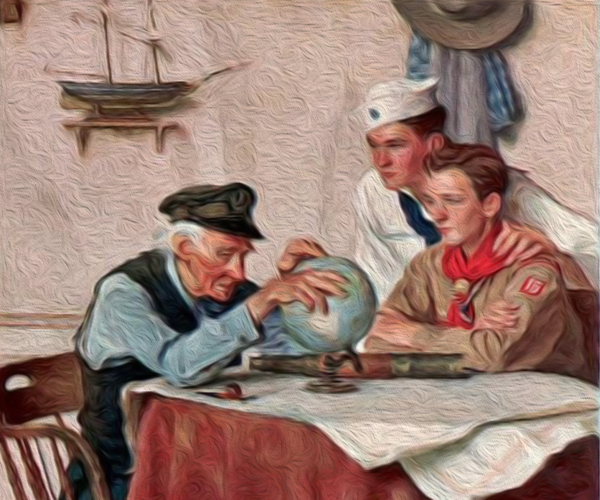
Understanding Military Terminology - Multispot ship
(DOD) Those ships certified to have two or more adjacent landing areas. See also spot. Joint Publications JP 3-14 (Joint Shipboard Helicopter and Tiltrotor Aircraft Operations)

The Old Salt’s Corner
“Brother Square-Toes” ~ Rewards and Fairies
If you can keep your head when all about you
Are losing theirs and blaming it on you,
If you can trust yourself when all men doubt you,
But make allowance for their doubting too;
If you can wait and not be tired by waiting,
Or being lied about, don’t deal in lies,
Or being hated, don’t give way to hating,
And yet don’t look too good, nor talk too wise:
If you can dream—and not make dreams your master;
If you can think—and not make thoughts your aim;
If you can meet with Triumph and Disaster
And treat those two impostors just the same;
If you can bear to hear the truth you’ve spoken
Twisted by knaves to make a trap for fools,
Or watch the things you gave your life to, broken,
And stoop and build ’em up with worn-out tools:
If you can make one heap of all your winnings
And risk it on one turn of pitch-and-toss,
And lose, and start again at your beginnings
And never breathe a word about your loss;
If you can force your heart and nerve and sinew
To serve your turn long after they are gone,
And so hold on when there is nothing in you
Except the Will which says to them: “Hold on!”:
If you can talk with crowds and keep your virtue,
Or walk with Kings—nor lose the common touch,
If neither foes nor loving friends can hurt you,
If all men count with you, but none too much;
If you can fill the unforgiving minute
With sixty seconds’ worth of distance run,
Yours is the Earth and everything that’s in it,
And—which is more—you’ll be a Man, my son!
~ Rudyard Kipling

“I’m Just Sayin”
“Under some conditions, it is rational for competitors to make their products as nearly identical as possible.”
~ Gracie Allen (for President 1940)

“Thought for the Day”
“This used to be a government of checks and balances. Now it's all checks and no balances.”
~ Gracie Allen (for President 1940)

“What I Have Learned”
“All the other candidates are making speeches about how much they have done for their country, which is ridiculous. I haven't done anything yet, and I think it's just common sense to send me to Washington and make me do my share.”
~ Gracie Allen (for President 1940)
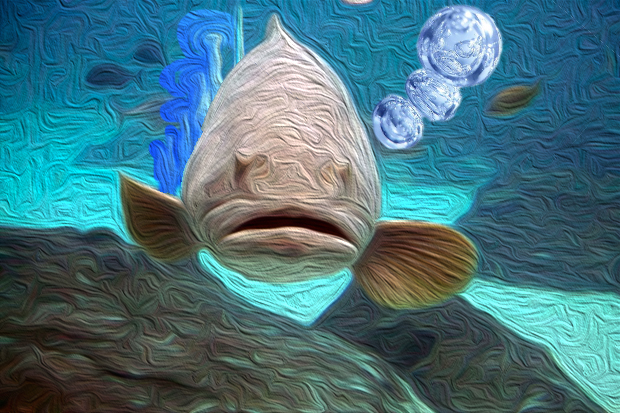
Bizarre News (we couldn’t make up stuff this good – real news story)
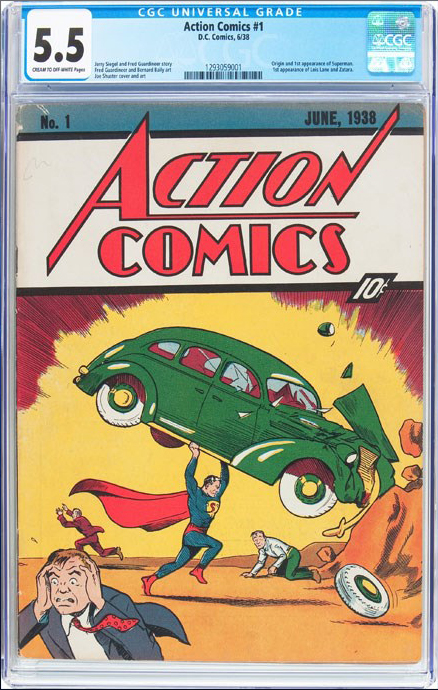
DALLAS, Texas - A rare copy of Action Comics #1, which marked the first appearance of Superman, was sold at an auction Thursday for close to $1 million.
Heritage Auctions in Dallas sold the edition for $956,000 - which far surpassed the original estimate of $750,000.
The comic, which debuted in June 1938, originally sold for $.10 a copy. There are about 100 copies of the issue believed to still be in existence.
“As the bidding went higher and higher we were grateful bidders recognized this copy as the gem it truly is,” said Lon Allen, Managing Director of Comics & Comic Art at Heritage Auctions. “Few copies of this comic survive, let alone come to auction with such a bright cover. It displays beautifully.”
UPI (08/06/2016) 

Mr. Answer Man Please Tell Us: Why Are Carrots Orange?
It may sound like a matter settled long ago, but why carrots are orange hasn't had a scientific explanation until now. Discovery reports that a team of researchers led by University of Wisconsin–Madison geneticist and horticulture professor Phil Simon recently published a study in the journal Nature Genetics detailing the first complete decoding of the carrot genome.
By studying the root vegetable's 32,115 genes, they were able to determine what caused formerly white carrots to become the bright orange snacks we know today. We can thank a gene called DCAR_032551 (also referred to as the carrot's Y gene), which plays an essential role in the accumulation of carotenoids, a class of natural pigments, in the carrot taproot.
“As well as sequencing the carrot genome we also studied specific genes, in particular part of the genome that includes the Y gene”, Simon told Australia's ABC News. “We found that the Y gene accounts for the accumulation of orange and yellow carotenoid pigments in carrot roots.”
The beta-carotene pigment naturally occurs in plants and fruits and is converted into vitamin A by the body. It is also found in foods like broccoli, spinach, and tomatoes, but it is the high concentration in carrots that accounts for the color. This is why consuming too many carrots or other beta-carotene rich foods can lead to carotenemia, a condition categorized by an increase of the pigment in the blood and skin discoloration.
According to the study, when carrot crops were first cultivated 1100 years ago in central Asia they were either purple or yellow (the original, wild carrot ancestors were white). Reliably orange carrots came later, around 1500 CE, and the pigment build-up was a “defect in a metabolic pathway that appears to be related to light-sensing”, according to the researchers. They're not sure why planters favored certain carrot colors over others (the pigment does not affect the taste), but the intentional selection of the most orange (and thus more nutritious) carrots over the past four decades has resulted in crops that have 50 percent more carotene than they did in 1970.
ABC News Australia
• Mental Floss
• Nature Genetics
• Seeker
• Wikipedia
• University of Wisconsin - Madison

Where Did That Saying Come From?
“Fathom out:” Meaning: To ascertain something; to deduce from the facts.
Origin: A fathom is one of those units of linear measurement that we learned at school (at least we did when I was at an English grammar school in the 14th century) and now can't quite remember just what length they refer to. There's the furlong (a 'furrow long', or the length of a mediaeval field - about 220 yards), the rod or pole or perch (all the same measurement - of five paces), the cubit (from the elbow to the fingertips). These peculiarly named units are matched in their imprecision by the fathom, which is the span encompassed by the outstretched arms from fingertip to fingertip - about six feet. Naturally, not everyone's arms were the same length and so the fathom wasn't an agreed distance.
The woolliness over the definition of the term is illustrated in Ephraim Chambers' Cyclopædia, 1728:
There are three kinds of Fathoms. The first, which is that of Men of War, contains six Feet: The middling, or that of Merchant Ships, five Feet, and a half; and the small one, used in Fluyts, Flyboats, and other Fishing-vessels, only five Feet.
The arbitrary escalation from 'one thousand' to 'ten thousand' and the switching from Japan to China as the source leads us to smell a rat with this derivation. In fact, Barnard didn't introduce the phrase - his only contribution was the incorrect suggestion that the country of origin was Japan or China. This has led to another popular belief about the phrase, that is, that it was coined by Confucius. It might fit the Chinese-sounding 'Confucius he say' style, but the Chinese derivation was pure invention.
When we say that we fathom something now we mean that we grasp or understand it. In the Middle Ages to fathom something was, in keeping with the literal 'fingertip to fingertip' meaning of the word, to encircle it with the arms. From the 14th century onward, people who embraced each other were said to be fathoming. That meaning has now fallen out of use, which at least spares us from daily 'fathom and tell' stories in our tabloid newspapers.
“Fathoming out” refers to measuring by using the outstretched arms, a usage that dates back to at least the 16th century; for example, this piece from Richard Eden's The Decades of the Newe Worlde, 1555:
Seuen men... with theyr armes streached furthe were scarsely able too fathame them [trees] aboute.
As time went by 'to fathom' began to mean 'to get to the bottom of' or 'to take soundings about'. This probably derives from the most commonly believed derivation of 'fathoming out', which is the measuring of the depth of water beneath a ship by use of a weight fixed to a rope marked out in fathoms. This 'sounding out' was known both literally and figuratively by the early 17th century; for example, this literal usage, recorded in Sir William Brereton's Travels in Holland, 1634:
“Fathoming the depth of the water over against Brill, we found it there where the buoys are placed to warn all seamen of the danger of that passage, that we had not above two feet more water than the ship drew.”
Fathoms are so strongly associated with seafaring that it seems unecessary to look any further than the nautical measurement as the source of 'fathom out', especially as this form of measuring was still commonplace when the term was coined.
Phrases.org.UK


NAVSPEAK aka U.S. Navy Slang
Lucky Bag: Collected unclaimed personal items, or such things confiscated as gear adrift, which were auctioned to the crew on paydays.
Lucky Charms: Nickname for w:Tripler Army Medical Center, which due to its coral pink color and location in the Moanalua hills of Honolulu, is used as a navigational aid for ships sailing into .


Just for you MARINE
MEF: Marine Expeditionary Force.
MEPS: Military Entrance Processing Station, facility where prospective recruits are screened medically, psychologically, and legally for recruit training.

Naval Aviation Squadron Nicknames
HSM-60 - Helicopter Maritime Strike Squadron: “Jaguars”
Naval Air Station Jacksonville or NAS Jacksonville, Florida
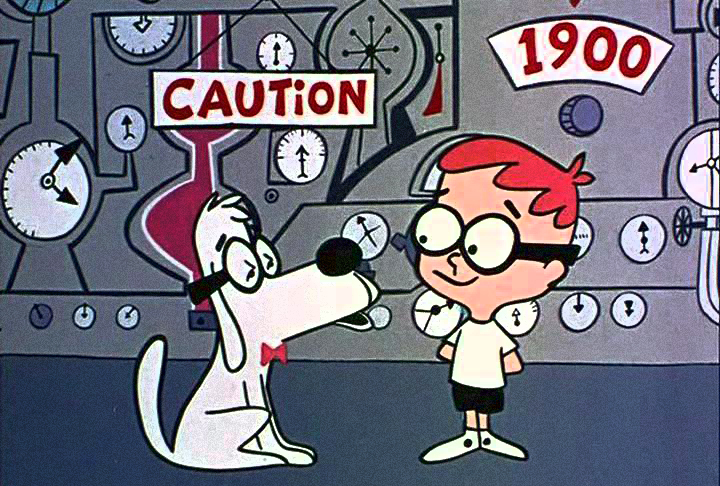
Science & Technology

Amateur astronomers are helping guide space pros to Jupiter and beyond
• Ferrari's added turbochargers and heavily revised the car—it's a winner
• People look guiltier when their actions are viewed in slow motion
• Suicide Squad would be better if it didn’t reek of desperation
• Xbox One controllers and Windows 10 PCs: It’s all a mess right now
• Jupiter’s moon Io loses its atmosphere when eclipsed
ARS Technica

The Strange, Mysterious or Downright Weird

The world’s longest aircraft was brought out of its hanger in England over the weekend. But the first thing most people noticed about the Airlander 10, besides its enormous size, was that its front looked like a huge behind.
It’s even been nicknamed “The Flying Bum” by the British media, and photos like this probably don’t help.
At 302 feet long, the Airlander 10 is 50 feet longer than the largest configuration of the Boeing 747.
Once it proves safe to fly, the airship could be used for surveillance, cargo, communications, humanitarian missions and passenger travel.
Huffington Post (08/08/2016) 

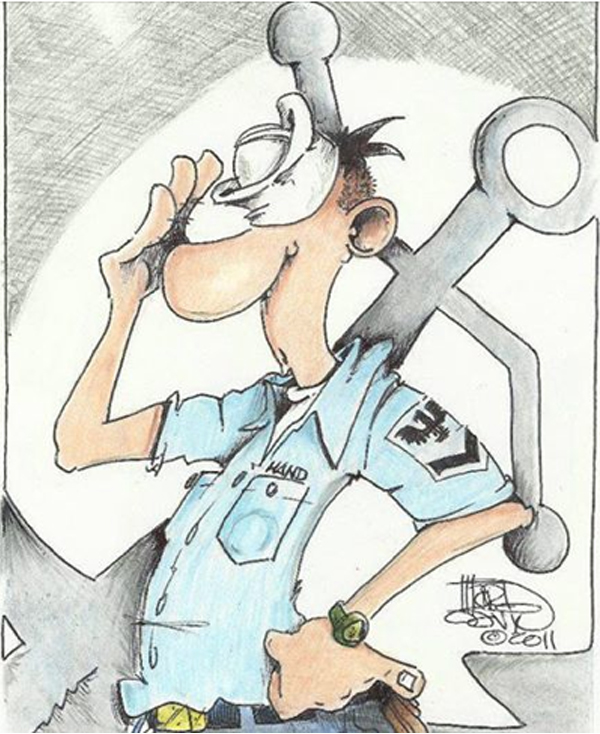
SONG FACTS

“Du Hast” - Rammstein
Album: Sehnsucht
Released 1997 
Although the German phrase does not translate to English, “Du hast” can mean “you have”, but it can also mean “you hate”. Therefore the song has two meanings. One being sort of “You hate me but still want to marry me” (the song is about marriage) and the other being “You want to marry me but I don't want to”.
There is another sort of double meaning here. If the line is read as “Tod der Scheide” it would be “until the death of the vagina” and not “until death, which would separate” (“Tod, der scheide”). The whole song is a play on German wedding vows (Wollen Sie einander lieben und achten und die Treue halten bis dass der Tod euch scheidet? - Do you want to love and respect each other and to remain faithful, until death separates you?). Instead of answering with “Ja”, Till says “Nein”, finally answering the question he said nothing to in the beginning.
“Hast” is a conjugation of the base form "haben" which means “to have”. To hate, would be the verb “hassen” which would be conjugated as “Du hasst mich” (you hate me). Though they are similar they are not homophones in that the S sounds in “hasst” for “hate” would be stressed a little more then it would in “hast” for “have”. This is confirmed when Till says, “Du hast mich gefragt und ich hab nights gesagt”, which literally means “You have asked me and I have said nothing.” “Hast” is used as the “haben” helper verb for the past participle “gefragt”, of which its base form is “fragen”, which means “to ask”.
In this song, the singer tries to offer encouragement to someone who sounds chronically depressed and hopeless, perhaps suicidal. People who are going through their worst times ever have been known to identify with the lyrics.
This song is played in the movie How High featuring rap artists Red Man and Method Man
Rammstein official site / Billboard / All Music / Song Facts / Wikipedia
Image: “Sehnsucht (album)” by Rammstein
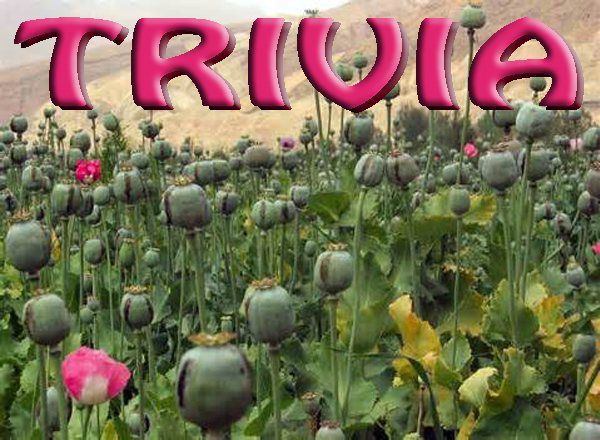
Trivia
● AFGHANISTAN is the world's leading grower of poppy flowers, producing more opium than the rest of the world combined.
● Liberia, capital is Monrovia, named after James, is one country outside the U.S. whose capital city is named after an American president. Many black slaves moved there after the U.S. civil war.
● Irish Sea (with the name of a country) borders England

A Test for People Who Know Everything
From the computer world: What does the word “modem” abbreviate?
● Answer for People Who Do Not Know Everything, or Want to Verify Their Answer MIT.edu
Answer to Last Week's Test
The largest adobe building in the United States and the oldest building in the U.S., 800 years old, are both located in which city?
Answer: Santa Fe, New Mexico. Wikipedia - Pakistan Dawn

Joke of the Day
My high school assignment was to ask a veteran about World War II. Since my father had served in the Philippines during the war, I chose him. After a few basic questions, I very gingerly asked, “Did you ever kill anyone?”
Dad got quiet. Then, in a soft voice, he said,“Probably. I was the cook.”
Pun of the Day
I wrote a book about birds. It flew off the shelf.


























